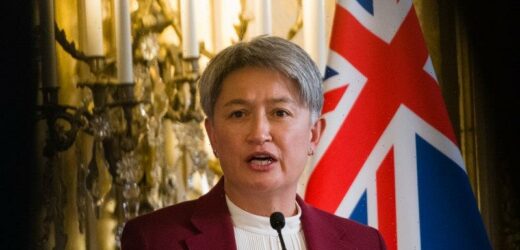London: Britain must be prepared to face up to the uncomfortable reality of its colonial past as part of its embrace of a modern Indo-Pacific region, Foreign Affairs Minister Penny Wong will say in a landmark policy speech in London.
Visiting the United Kingdom for the first time in her role, Wong will tell an audience at King’s College that the character of the 250-year relationship between the two nations has changed and Australia now sees itself as part of the region, which she says has become “the most consequential region of our time”.
Penny Wong will speak about the changes in the UK and Australia’s relationship at the King’s College.Credit:Nathan Laine
Evoking her own family’s experience of British colonialism, the Malaysian-born Wong says countries such as Britain won’t find common ground in the region if they stayed “sheltered in narrower versions” of their histories.
“Such stories can sometimes feel uncomfortable – for those whose stories they are, and for those who hear them,” a draft version of Wong’s speech circulated on Tuesday says.
“But understanding the past enables us to better share the present and the future.”
Britain, along with the United States, Australia and France, is seeking to build security and trade ties in the Indo-Pacific with a shift in foreign policy strategy. The strategy is a direct response to the rise of Chinese assertiveness in the region where flashpoints include unresolved territorial disputes in the South China Sea and the East China Sea, nuclear proliferation and climate change.
As a former colonial power, Britain continues to wrestle with its past, while the royal family also faces mounting calls to apologise and pay reparations for slavery, where across the world men, women and children were forced to work under harsh and dehumanising conditions on plantations and subjected to extreme physical, mental and sexual violence.
Wong says while her mother’s great-great-grandparents were some of the first British to settle in South Australia, the other side of her family had “a very different” experience of British colonisation.
“My father is descended from Hakka and Cantonese Chinese,” she will say. “Many from these clans laboured for the British North Borneo company in tin mines and plantations for tobacco and timber. Many worked as domestic servants for British colonists, as did my own grandmother.”
Wong says understanding the past would enable all nations to “better share the present and the future”.
“It gives us the opportunity to find more common ground than if we stayed sheltered in narrower versions of our countries’ histories. It helps open the world to us. It helps open the Indo-Pacific to us.”
Praising the work of former Labor prime ministers Gough Whitlam and Paul Keating, who both shifted Australia’s perspective towards Asia in the latter part of the 20th century, Wong says Australia is now home to “people of more than 300 ancestries and the oldest continuing culture on earth”.
“Australia sees itself as being in the Indo-Pacific, and being of the Indo-Pacific.”
In an acknowledgment of the rise of Britain’s first prime minister of south Asian heritage, Rishi Sunak, and several senior government ministers from African and non-white backgrounds, Wong says the changing face of Australia and Britain has become “readily apparent” both among its citizens and its political leaders.
British Prime Minister Rishi Sunak has a south Asian heritage.Credit:Getty
Visiting Britain and mainland Europe with Defence Minister Richard Marles as part of several dialogues with counterparts, Wong will address the ever-growing influence of Beijing in the Indo-Pacific region directly, saying it was up to all countries to ask themselves “how can we each use our national power, our influence, our networks, our capabilities, to avert catastrophic conflict”.
“I have put Australia’s view on this directly to my Chinese counterpart, when I made the first Australian ministerial visit to China in three years just before Christmas,” she will say.
“If conflict were to break out in the Indo-Pacific, it would be catastrophic – for our people and our prosperity.
“Australia sees our investment in our future defence capabilities as essential for deterring conflict and maintaining a strategic balance in the Indo-Pacific.”
She will also praise the UK’s decision to broaden its economic ties in the region, adding that advancing prosperity would help alleviate poverty and lessen disadvantage.
“It is not only a contribution to humanity’s betterment, it is an investment in our own security. Stability and prosperity are mutually reinforcing,” she will say.
Cut through the noise of federal politics with news, views and expert analysis from Jacqueline Maley. Subscribers can sign up to our weekly Inside Politics newsletter here.
Most Viewed in Politics
From our partners
Source: Read Full Article




